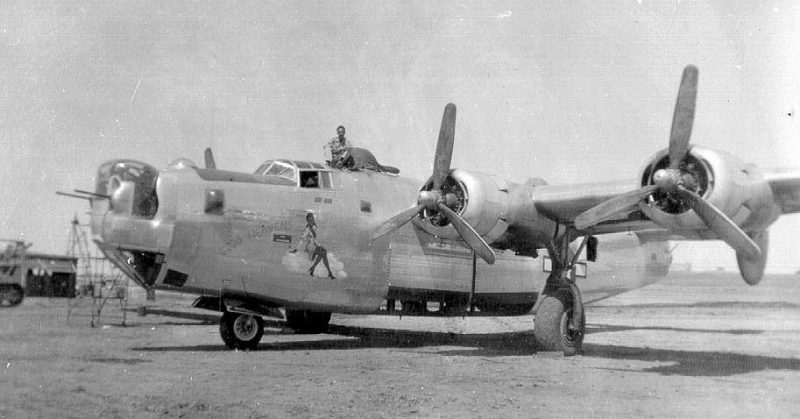Living through a harrowing experience, such as WWII, leaves many anxieties in its wake, the least of which are the dreams that your subconscious puts together in the dead of night. George Leland, now aged 91, was one of the approximately 16 million Americans that served during WWII and having lived through such an experience, he knows these dreams well, as his mind frequently trips back to the horrors of war.
Leland served the 15th Army Air Forces 460th Bomber Group, in the 762nd Squadron, as a nose gunner on a B-24 bomber. His duties, in addition to serving as a gunner, were to go back into the bomb bay and manually release any bombs that had failed to mechanically release. George is the last alive, of this Army Air Force crew of 10, with whom he served in Italy. He remembered each member of the crew and faithfully kept in touch after being demobbed, “I corresponded with them until the last one passed away,” he said.
Today, the Department of Veterans Affairs has a record of only 697,000 WWII veterans that are still alive, and at the current rate of attrition, within the next ten years there will be no-one alive that served at that time. Once this happens the world will be a poorer place as the men and women that served, had a very different outlook on life to the modern young person. Leyland summed it up very well, “World War II was different than nowadays,” he said. “Almost everyone wanted to go. Young people were different when I was young. They were more mature. They lived in the (Great) Depression and had nothing. They were harder working and more diligent and they had much more respect for authority.”
Recalling his life during the war; Leyland coughs often as a result of lungs damaged by aircraft smoke. He is realistic about what happened during that difficult time and holds no romantic views about war and the difficulties faced by the average soldier, saying it was his job, “to destroy property and kill. I don’t have any feeling about it. You did what you were told and you obeyed your orders. You learn quickly when you got over there — to survive. It’s something that had to be done.”
The dangers and realities of serving were forcefully brought home when he lost one of his friends during their first mission. “When you’re a kid, you don’t realize until something like that happens.”
His life was very structured, as were all those of people serving in the military. Sleeping on the ground, one of six in a five-man tent pitched amongst rows of similar tents, reveille at 4:30 am, a light breakfast and then briefing on the day’s mission. Knowing that at 29,000 feet the temperature could drop to 44 degrees below freezing, he, like his crew mates, dressed in warm clothing. Having nothing, servicemen used their ingenuity to create something out of trash such as radios out of cigar boxes and crashed airplane parts.
On returning Stateside after the war, trying to adjust to civilian life was not easy. He missed the regimented routine, and he missed the camaraderie of his fellow servicemen, “Everyone’s life depended on everyone else and you get pretty close,” he said. To this day he feels most at home when visiting and chatting with a veterans group. They shared similar experiences and understood exactly how he feels, “Everyone understands each other better, even though you don’t talk about it.”
On his return to civilian life, Leland worked as a market researcher and he and his wife, Delores, purchased a home in 1953 in Garden City. At that time everyone in the neighbourhood was WWII veterans as they received financing at lower interest rates. George and Delores have been married for 68 years, still, live in the same house, and have three children, five grandchildren, and eleven great-grandchildren. George still cuts a fine figure and has a keen sense of humour.
He is a proud veteran who demands respect for the photographs and medals that adorn a wall in the back bedroom. Slightly faded photographs of himself, his squad and the life they led back in the mid-1940s. It is not surprising that occasions such as Veterans Day are very important to this old warhorse and when asked how important, he answered, “An awful, awful, awful lot“. He makes a point of attending the Veterans Day Service at the Garden City Hall and he always attends a veterans post for a chat and some snacks, HomeTownLife reported.
The modern world owes a great deal to the men and women who fought during WWII, and it is sad to think that within a few short years there will be no George Leland to recount firsthand the stores associated with this time. It behoves each of us, to make sure that we take the opportunity that we have right now, to capture these memories so they can be passed on to future generations, and not be lost to the sands of time.
